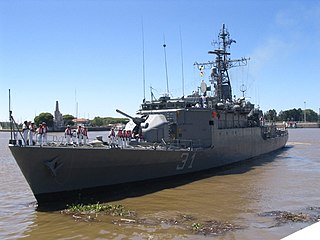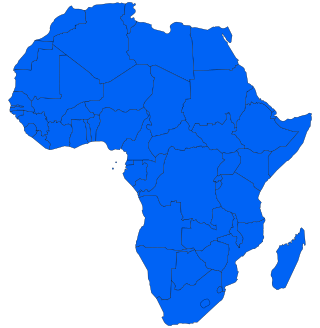
United Nations Security Council Resolution 181, adopted on August 7, 1963, was concerned with an arms build-up by the Republic of South Africa and fears that those arms might be used to further the racial conflict in that country. The Council called upon the government of South Africa to abandon its policy of apartheid, as first requested to by Resolution 134 (1960), and called upon all states to voluntarily cease the sale and shipment of all arms, ammunition and other military equipment to South Africa.

United Nations Security Council Resolution 418, adopted unanimously on 4 November 1977, imposed a mandatory arms embargo against South Africa. This resolution differed from the earlier Resolution 282, which was only voluntary. The embargo was subsequently tightened and extended by Resolution 591.

United Nations Security Council Resolution 311, adopted on February 4, 1972, after reaffirming previous resolutions on the topic and noting the continued military build-up by South Africa, the Council condemned the policy of apartheid and recognized the legitimacy of the struggle of the oppressed people of South Africa.

United Nations Security Council resolution 591, adopted unanimously on 28 November 1986, after recalling resolutions 418 (1977), 421 (1977), 473 (1980) and 558 (1984), the Council strengthened the mandatory arms embargo against apartheid South Africa imposed by Resolution 418, and made it more comprehensive. Resolution 591 sought to clarify vague terms from previous resolutions on the topic.

United Nations Security Council Resolution 421, adopted unanimously on December 9, 1977, after recalling Resolution 418, the Council decided to establish a committee to oversee the implementation of that resolution. It tasked the committee to report back on its observations and recommendations regarding ways in which the arms embargo could be made more effective against South Africa and to ask Member States as to how they are implementing the resolution.

United Nations Security Council resolution 473, adopted unanimously on 13 June 1980, after recalling resolutions 392 (1976), 417 (1977), 418 (1977), 454 (1979) and 466 (1980) and letters from the Committee for South Africa, the council expressed its concern and condemned South Africa for the killing of protesters, including schoolchildren, opposed to apartheid.

United Nations Security Council resolution 546, adopted on 6 January 1984, after hearing representations from the People's Republic of Angola, the council recalled resolutions 387 (1976), 428 (1978), 447 (1979), 454 (1979), 475 (1980) and 545 (1983), and expressed its concern at the continuing attacks on the country by South Africa through occupied South West Africa.

United Nations Security Council resolution 558, adopted unanimously on 13 December 1984, after recalling resolutions 418 (1977) and 421 (1977) which imposed a compulsory arms embargo on South Africa and established a committee to monitor it, the council stressed the continuing need for all Member States and international organisations to observe the arms embargo.

United Nations Security Council resolution 566, adopted on 19 June 1985, after recalling resolutions 269 (1969), 276 (1970), 301 (1971), 385 (1976), 431 (1978), 432 (1978), 435 (1978), 439 (1978), 532 (1983) and 539 (1983), the Council expressed concern at the tension and instability caused the continued occupation of Namibia by South Africa, noting the apartheid policies implemented in the territory and that the territory was used as a springboard for attacks on other southern African countries.

United Nations Security Council resolution 568, adopted on 26 July 1985, after expressing its outrage and concern at the suffering caused by the apartheid system in South Africa, the Council further condemned the repressive policies of the apartheid system including murders and forced removals, as well as the state of emergency imposed in 36 districts in the country, demanding it be lifted immediately.

United Nations Security Council resolution 571, adopted unanimously on 20 September 1985, after hearing representations from the People's Republic of Angola, the Council recalled resolutions including 387 (1976), 418 (1977), 428 (1978), 447 (1979), 454 (1979), 475 (1980), 545 (1983) and 546 (1984), and expressed its concern at the continuing attacks on the country by South Africa through occupied South West Africa.

United Nations Security Council resolution 574, adopted unanimously on 7 October 1985, after hearing representations from the People's Republic of Angola, the Council recalled resolutions 387 (1976), 418 (1977), 428 (1978), 447 (1979), 454 (1979), 475 (1980), 545 (1983), 546 (1984), 567 (1985) and 571 (1985), and expressed its concern at the continuing attacks on the country by South Africa through occupied South West Africa.

United Nations Security Council resolution 919, adopted unanimously on 25 May 1994, after recalling all resolutions on South Africa, in particular resolutions 282 (1970), 418 (1977), 421 (1977), 558 (1984) and 591 (1986), the Council welcomed the recent general elections and new government and decided, under Chapter VII of the United Nations Charter, to terminate the arms embargo and all other restrictions against South Africa.

The United Nations Security Council resolution 1196 was adopted unanimously on 16 September 1998, after recalling Resolution 1170 (1998) on Africa; the Council discussed the importance of strengthening the effectiveness of arms embargoes in place in several countries across the continent.

United Nations Security Council resolution 1425, adopted unanimously on 22 July 2002, after recalling resolutions on the situation in Somalia, particularly resolutions 733 (1992) and 1407 (2002), the council established a panel of experts to investigate violations of the arms embargo against the country.

United Nations Security Council resolution 1596, adopted unanimously on 18 April 2005, after recalling all previous resolutions on the situation in the Democratic Republic of the Congo, including resolutions 1493 (2003), 1533 (2004), 1552 (2004), 1565 (2004) and 1592 (2005), the council expanded the arms embargo to include all recipients of weapons in the country, and imposed a travel ban and asset freeze on those violating the embargo.
Since the end of apartheid, foreign trade in South Africa has increased, following the lifting of several sanctions and boycotts which were imposed as a means of ending apartheid.

United Nations Security Council Resolution 1724, adopted unanimously on November 29, 2006, after recalling previous resolutions on the situation in Somalia, particularly resolutions 733 (1992), 1519 (2003), 1558 (2004), 1587 (2005), 1630 (2006) and 1676 (2006), the Council re-established a group to monitor the arms embargo against the country for a further six months and condemned an increase in the flow of weapons to the country.

As a response to South Africa's apartheid policies, the international community adopted economic sanctions as a form of condemnation and pressure. Jamaica led the movement by being the first country to ban goods from apartheid South Africa in 1959.













